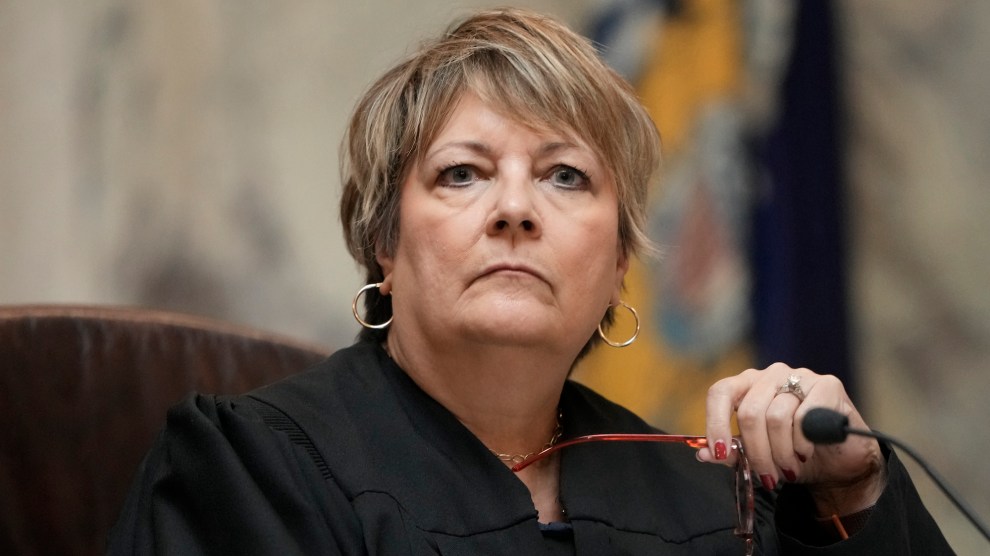
Wisconsin Supreme Court Justice Janet Protasiewicz attends her first hearing as a justice, Sept. 7, 2023, in Madison, Wis. Morry Gash/AP
On Tuesday, the Wisconsin Supreme Court heard arguments in a landmark case challenging heavily gerrymandered state legislative districts. The court’s decision could lead to fairer maps in 2024, which voting rights activists say will go a long way toward restoring representative democracy in one of the country’s most important battleground states.
Even before it was heard, the case generated controversy when Wisconsin Republicans threatened to impeach Judge Janet Protasiewicz, who was elected in April, so that the new court’s new progressive majority could not strike down the GOP-drawn maps. This wildly anti-democratic power grab backfired on the GOP and Protasiewicz is now in a position to be the deciding vote invalidating the maps.
“November 21 could be remembered as a turning point moment in Wisconsin history,” says Wisconsin Democratic Party chair Ben Wikler. “The decision the court makes after hearing these arguments will determine whether Wisconsin is a democracy for years to come.”
Democrats have won 14 of the past 17 statewide elections in Wisconsin, but Republicans’ seemingly voter-proof majorities in the legislature—the result of the skewed maps passed by the GOP in 2011 and 2021—have allowed them to repeatedly thwart the will of a majority of the state’s voters while undercutting the victories of Democratic candidates. In 2022, Democratic Gov. Tony Evers won re-election with 51 percent of the vote, but Republicans retained 65 percent of seats in the state assembly and 67 percent in the state senate, gaining a supermajority in the senate and coming just two seats short of a supermajority in the assembly, which would have allowed them to override the governor’s vetoes and make him functionally irrelevant.
Since 2011, when GOP operatives drew new redistricting maps in secret, Wisconsin has been one of the most gerrymandered states in the country. This advantage has given legislative Republicans a green light to entrench their own power. After Evers’ 2018 election victory, for example, they passed a series of lame-duck laws stripping the governor’s power. At the same time, the size of their majorities has allowed them to block, with little accountability, popular policies on such issues as abortion rights, firearm restrictions, health care, and education.
The maps adopted by Republicans in 2021 preserved and expanded the GOP’s inflated majorities, largely because the then-conservative majority on the Wisconsin Supreme Court ruled that it would rule in favor of state legislative and congressional maps that made the “least changes” from 2011, which virtually ensured that the new lines would be heavily stacked in the GOP’s favor. Republican Assembly leader Robin Vos admitted that the “least changes” requirement was “not in the [Wisconsin] Constitution” and that the new lines were passed for partisan purposes.
In August, one day after Protasiewicz was sworn into office, voting rights organizations that included Law Forward, a progressive legal group based in Madison, filed a new lawsuit challenging the state legislative maps. It called them “extreme partisan gerrymanders” that “retaliate against some voters based on their viewpoint and free speech, in violation of Wisconsin’s guarantee of free speech…treat some voters worse than others based on their political views and where they live in violation of Wisconsin’s guarantee of equality…and violate the promise of a free government found in the Wisconsin constitution.”
The court narrowed the oral arguments to two issues: whether the GOP maps violated the state constitution’s requirement that districts consist of “contiguous territory” and whether they ran afoul of the separation of powers, since the prior conservative majority took control of the redistricting process in 2021 and chose the legislature’s preferred maps, effectively thwarting Evers’s veto power. “The Wisconsin constitution’s requirements are not optional,” said Mark Gaber, counsel for the Campaign Legal Center, who spoke first for the voting rights groups.
The GOP maps were defended by two conservative lawyers, Taylor Meehan of Consovoy McCarthy, a law firm that has represented Donald Trump and challenged the constitutionality of the Voting Rights Act, and Rick Esenberg, president of the Wisconsin Institute for Law and Liberty (WILL), a conservative legal group that has advocated for policies that make it harder to vote. WILL was founded at the beginning of the gubernatorial tenure of Scott Walker, who served from 2011 to 2019, with start-up money from the Bradley Foundation—a hugely influential but little-known conservative foundation based in Milwaukee—to be “the ACLU of Wisconsin’s Right.” It is part of a sprawling network of Bradley-funded think tanks, media organizations, and advocacy groups that boosted many of the policy ideas behind Walker’s conservative agenda and pushed Wisconsin far to the right.
The court arguments on Tuesday lasted more than three hours and were highly contentious. Conservative Justice Rebecca Bradley interrupted Gaber after the first sentence of his opening statement, chiding him for bringing a new challenge to the maps after the court flipped from a conservative to progressive majority. “Everybody knows that the reason we’re here is because there was a change in the membership of the court,” she said.
Wisconsin Republicans aggressively attempted to prevent Protasiewicz from hearing the case after her 11-point win in April gave progressives their first majority on the court in fifteen years. They filed a motion demanding she step aside from hearing the case because she called the maps “rigged” during the campaign and accepted $10 million in campaign funds from the Wisconsin Democratic Party, which is not a party to the lawsuit. If she refused to recuse herself, Republican leaders threatened to remove her from office, which would have essentially nullified her election by erasing the one-vote liberal majority on the court. “You cannot have a judge who said, you know, the maps are rigged,” Vos said. “Then she sits on that trial acting like she’s gonna listen and hear both sides fairly? That just can’t happen.”
Their threat sparked a furious public backlash, even from some Republicans. Legal scholars noted that impeachment for civil officers is reserved only for “corrupt conduct in office, or for crimes and misdemeanors” and has seldom been used against judges in Wisconsin. Only one judge has been impeached by the legislature since 1853, for alleged bribery, and he was acquitted. Democrats launched a $4 million campaign to pressure legislative Republicans to back down. Polling from A Better Wisconsin Together, a liberal group, found that Wisconsinites opposed impeaching Protasiewicz by a 24-point margin.
Vos set up a panel of three retired conservative justices to advise him on impeachment, but they did not reach the conclusions he wanted, with two of the three judges advising against impeaching Protasiewicz. “To sum up my views, there should be no effort to impeach Justice Protasiewicz on anything we know now,” wrote Justice David Prosser, who donated to Protasiewicz’s opponents during the campaign. “Impeachment is so serious, severe, and rare that it should not be considered unless the subject has committed a crime, or the subject has committed indisputable ‘corrupt conduct’ while ‘in office.’” That view was seconded by Justice Jan Wilcox, who also donated to Protasiewicz’s opponents. “I do not favor impeachment,” he told the AP. “Impeachment is something people have been throwing around all the time. But I think it’s for very serious things.”
In October, Protasiewicz refused to recuse herself, citing opinions written by conservative justices on the US Supreme Court and Wisconsin Supreme Court that allow judges to weigh in on hot-button issues during their campaigns and hear cases that impact their campaign supporters.
“It would be unworkable, and again unprecedented, to conclude that the Due Process Clause requires every elected judge to recuse whenever their involvement might be predicted (before they have even cast a vote) to benefit non-parties who supported their campaign,” she wrote. “Indeed, this court would grind to a halt if that were the constitutional standard for recusal. We would be flooded with requests for ‘conservative’ or ‘liberal’ justices to recuse whenever a case involved issues of great social or political importance to any major campaign funder.”
Instead of pressing ahead with impeachment proceedings against Protasiewicz after she decided to hear the case, Vos backed down, shelving the impeachment inquiry for now. “The intensity of the public backlash seems to have taken the GOP by surprise,” says Wikler. “They’re not used to anyone questioning their power to inflict their will on Wisconsin voters.”
Of course, the fight is far from over. Vos says impeachment is still “on the table,” and if Protasiewicz votes to strike down the maps, he has vowed to appeal any decision by the Wisconsin Supreme Court to the US Supreme Court.
But Wikler says Vos is in “face-saving mode” and predicts that if Republicans lacked the political will to impeach Protasiewicz while representing safe GOP districts, they’ll be less likely to pursue that nuclear option if the court strikes down the existing maps and puts in place many more competitive seats in 2024. “If the Supreme Court puts fair maps into place, then a lot of Republicans are going to be trying to figure out how to appeal to independent and moderate voters,” he says. “And overturning landslide elections is usually not the best path to do that.”
Over the past decade-and-a-half, Wisconsin has seen competitive elections for everything but control of the legislature. Since the GOP-drawn maps took effect in 2011, even when Democrats won 53 percent of the statewide vote, they’ve never held more than 39 percent of seats in the state assembly, Law Forward notes. Republicans, in contrast, have never fallen below 60 percent of seats, even while garnering just 44.8 percent of the statewide vote.
“The maps should reflect how the voters voted,” Gaber said Tuesday.
An opinion by the Wisconsin Supreme Court striking down the GOP’s gerrymandered maps could finally change that. “If the state supreme court creates standards that make Wisconsin a democracy when it comes legislative races, voters will finally have a say in the destiny of their state,” Wikler says. “And the era where Republicans only ever have to think about Republican primary challenges will come to an end.”
















